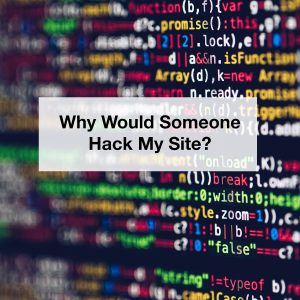
All day, every day, attempts are being made to hack into your website. Regardless of the content, every website is a target. According to Forbes, more than 30,000 websites are hacked every single day.
Some attacks are site-specific. In this case, a real person has decided to try to break into the website of a specific business or organization. However, most hackers use automated tools to do their work en masse. These tools automatically probe every website they find for known vulnerabilities.
Automated attacks are dangerous, and hackers can caste a wide net with very little effort. While some hack sites for the shear pleasure of breaking in, the primary motivation of a hacker is financial. In fact, the content of the website they are hacking is usually irrelevant. Wherever there is a vulnerability, cyber criminals are happy to hack, infect and spread.
When a site is hacked, Google will soon detect that it is infected. If nothing is done about it, the site will be blacklisted. Once a domain is blacklisted, it becomes inaccessible to all visitors. This can make it very difficult to do business.
What’s the goal?
Our clients often ask us, why would anyone want to hack my site? We’re a small business, a personal blog, an arts organization, cyber criminals aren’t going to target us. We don’t do ecommerce, we don’t have any critically sensitive material on there, what is the point?
A hacker can have many goals.
Redirect traffic
Some hackers wish to increase traffic to their own website or to a website of someone who has hired them. By injecting a malicious script onto your web server, they redirect traffic from your website to theirs.
This is bad for so many reasons. It can confuse your customers, who unwittingly click on a link on your website taking them to a scam site, damaging your authority and reputation. It can also result in your site visitor’s computer getting a virus.
Install malware
If a cyber-criminal hacks into your website, they can plant malware. Then your site visitors, trusting that your site is safe, may download the malicious file and their own computer can become infected. In addition, a malware-infected site may become part of a botnet that launches attacks on other vulnerable websites. Your little website is now part of a giant malware machine.
Install ransomeware
The hacker may take over your site and hold it for ransom until you pay up.
Generate backlinks
A link from one website to another is a backlink. Backlinks are an especially important element of SEO (Search Engine Optimization.) Hackers can plant a backlink on your site linked to their own site or to their client’s site, and this can improve their own SEO.
Free advertising
Hackers can plant advertising showing their product on your site.
Steal sensitive user data
Hackers can steal sensitive information from any site that has multiple users. Even if you don’t store customers’ payment information on your site, you are still vulnerable. Any personal information is valuable to a hacker.
Tips to protect your website from hackers
To hack a website, the cyber-criminal looks for an entry point, a place where they can breach the software, a security loophole.
- Always use strong passwords. The single most important thing you can do to protect your website is to use a strong password. Twelve characters or more. Not real words and not something specifically related to you.
- Use a reputable developer. Yes, these days almost anyone can build a website. But unless you understand the best practices of web development, including website security, you are putting your website, your site visitors and your business at risk.
- Use a high-quality hosting service. The monthly cost of web hosting varies widely. The best hosts charge more, but in return you can expect a more secure platform, in addition to better performance.
- Be careful about where you buy your themes and plugins. If you’re building a website that involves acquiring a theme or plugin, only purchase from a reputable market.
- Keep all software up to date. Criminals can easily detect and exploit out of date systems and applications.
- Always use HTTPS: HTTPS keeps internet connections secure and prevents criminals from reading or modifying information in transit.
- Employ change notifications. Change detection and notification (CDN) automatically detects changes made to a website.
Why would someone want to hack my site?
Regardless of the type of website you have or how much traffic it receives, your site is a target. The initial attack could come from a real person or a bot, but you can be sure that if you don’t take security seriously, your site is ripe for attack. We take security seriously and are careful with every site we build. If you’re concerned about the security of your own site, give us a call to begin a technical review. Call us at (518) 392-0846 or email [email protected].
